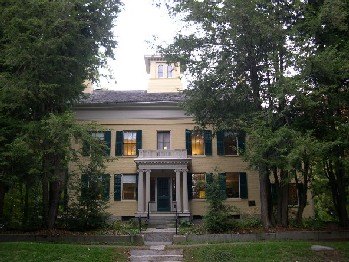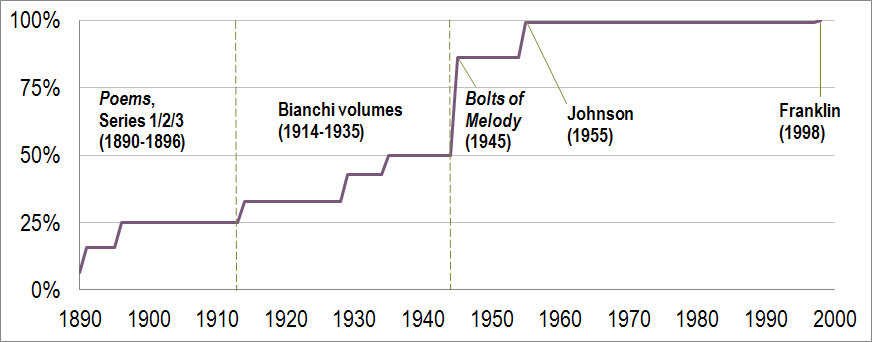|
A Bird Came Down The Walk
"A Bird came down the Walk" is a short poem by Emily Dickinson (1830–1886) that tells of the poet's encounter with a worm-eating bird. The poem was first published in 1891 in the second collection of Dickinson's poems. Text : Critique Helen Vendler regards the poem as a "bizarre little narrative" but one that typifies many of Dickinson's best qualities. She likens the poet to a reporter observing a murderer in the act, and later, pretending fear that the murderer may be dangerous to herself and must be mollified by a "crumb". The bird takes flight and Vendler regards what follows - the description of the bird in flight - as "the astonishing part of the poem". Vendler notes that the poem typifies Dickinson's "cool eye, her unsparing factuality, her startling similes and metaphors, her psychological observations of herself and others, her capacity for showing herself mistaken, and her exquisite relish of natural beauty".Helen Vendler. ''Dickinson: selected poems and commentari ... [...More Info...] [...Related Items...] OR: [Wikipedia] [Google] [Baidu] |
Emily Dickinson
Emily Elizabeth Dickinson (December 10, 1830 – May 15, 1886) was an American poet. Little-known during her life, she has since been regarded as one of the most important figures in American poetry. Dickinson was born in Amherst, Massachusetts, into a prominent family with strong ties to its community. After studying at the Amherst Academy for seven years in her youth, she briefly attended the Mount Holyoke Female Seminary before returning to her family's home in Amherst. Evidence suggests that Dickinson lived much of her life in isolation. Considered an eccentric by locals, she developed a penchant for white clothing and was known for her reluctance to greet guests or, later in life, even to leave her bedroom. Dickinson never married, and most of her friendships were based entirely upon correspondence. Although Dickinson was a prolific writer, her only publications during her lifetime were one letter and 10 of her nearly 1,800 poems. The poems published then were usua ... [...More Info...] [...Related Items...] OR: [Wikipedia] [Google] [Baidu] |
Helen Vendler
Helen Vendler (née Hennessy; April 30, 1933 – April 23, 2024) was an American academic, writer and literary critic. She was a professor of English language and history at Boston University, Cornell, Harvard, and other universities. Her academic focus was critical analysis of poetry and she studied poets from Shakespeare and George Herbert to modern poets such as Wallace Stevens and Seamus Heaney. Her technique was close reading, which she described as "reading from the point of view of a writer". Vendler reviewed poetry regularly for periodicals including ''The New Yorker'' and ''The New York Review of Books''. She was also a regular judge for the National Book Award and Pulitzer Prize and so was influential in determining writers' reputation and success. Life and career Helen Hennessy was born on April 30, 1933, in Boston, Massachusetts, to George Hennessy and Helen Hennessy. She was the second of three children. Her parents encouraged her to read poems as a child. Vend ... [...More Info...] [...Related Items...] OR: [Wikipedia] [Google] [Baidu] |
Harold Bloom
Harold Bloom (July 11, 1930 – October 14, 2019) was an American literary critic and the Sterling Professor of humanities at Yale University. In 2017, Bloom was called "probably the most famous literary critic in the English-speaking world". After publishing his first book in 1959, Bloom wrote more than 50 books, including over 40 books of literary criticism, several books discussing religion, and one novel. He edited hundreds of anthologies concerning numerous literary and philosophical figures for the Chelsea House publishing firm. Bloom's books have been translated into more than 40 languages. He was elected to the American Philosophical Society in 1995. Bloom was a defender of the traditional Western canon at a time when literature departments were focusing on what he derided as the "School of Resentment" (which included multiculturalism, feminism, and Marxism). He was educated at Yale University, the University of Cambridge, and Cornell University. Early life and education ... [...More Info...] [...Related Items...] OR: [Wikipedia] [Google] [Baidu] |
Thomas Wentworth Higginson
Thomas Wentworth Higginson (December 22, 1823May 9, 1911), who went by the name Wentworth, was an American Unitarianism, Unitarian minister, author, Abolitionism, abolitionist, politician, and soldier. He was active in abolitionism in the United States during the 1840s and 1850s, identifying himself with disunion and militant abolitionism. He was a member of the Secret Six who supported John Brown (abolitionist), John Brown. During the American Civil War, Civil War, from 1862 to 1864, he served as colonel of the 1st South Carolina Volunteers (Union), 1st South Carolina Volunteers, the first federally authorized United States Colored Troops, black regiment. Following the war, he wrote ''Army Life in a Black Regiment'' and devoted much of the rest of his life to fighting for the rights of freed people, women, and other disfranchised people. He is also remembered as a mentor to poet Emily Dickinson. Early life and education Higginson was born in Cambridge, Massachusetts, on December ... [...More Info...] [...Related Items...] OR: [Wikipedia] [Google] [Baidu] |
List Of Emily Dickinson Poems
This is a list of poems by Emily Dickinson Emily Elizabeth Dickinson (December 10, 1830 – May 15, 1886) was an American poet. Little-known during her life, she has since been regarded as one of the most important figures in American poetry. Dickinson was born in Amherst, Massac .... In addition to the list of first lines which link to the poems' texts, the table notes each poem's publication in several of the most significant collections of Dickinson's poetry—the "manuscript books" created by Dickinson herself before her demise and published posthumously in 1981; the seven volumes of poetry published posthumously from 1890 to 1945; the cumulative collections of 1924, 1930, and 1937; and the scholarly editions of 1955 and 1998. Important publications which are ''not'' represented in the table include the 10 poems published (anonymously) during Dickinson's lifetime;Franklin 1998, pp 1531-32. and editions of her letters, published from 1894 on, which include some p ... [...More Info...] [...Related Items...] OR: [Wikipedia] [Google] [Baidu] |
American Poems
American(s) may refer to: * American, something of, from, or related to the United States of America, commonly known as the "United States" or "America" ** Americans, citizens and nationals of the United States of America ** American ancestry, people who self-identify their ancestry as "American" ** American English, the set of varieties of the English language native to the United States ** Native Americans in the United States, indigenous peoples of the United States * American, something of, from, or related to the Americas, also known as "America" ** Indigenous peoples of the Americas * American (word), for analysis and history of the meanings in various contexts Organizations * American Airlines, U.S.-based airline headquartered in Fort Worth, Texas * American Athletic Conference, an American college athletic conference * American Recordings (record label), a record label that was previously known as Def American * American University, in Washington, D.C. Sports teams S ... [...More Info...] [...Related Items...] OR: [Wikipedia] [Google] [Baidu] |
Poetry By Emily Dickinson
Poetry (from the Greek language, Greek word ''poiesis'', "making") is a form of literature, literary art that uses aesthetics, aesthetic and often rhythmic qualities of language to evoke meaning (linguistics), meanings in addition to, or in place of, Denotation, literal or surface-level meanings. Any particular instance of poetry is called a poem and is written by a poet. Poets use a variety of techniques called poetic devices, such as assonance, alliteration, Phonaesthetics#Euphony and cacophony, euphony and cacophony, onomatopoeia, rhythm (via metre (poetry), metre), and sound symbolism, to produce musical or other artistic effects. They also frequently organize these effects into :Poetic forms, poetic structures, which may be strict or loose, conventional or invented by the poet. Poetic structures vary dramatically by language and cultural convention, but they often use Metre (poetry), rhythmic metre (patterns of syllable stress or syllable weight, syllable (mora) weight ... [...More Info...] [...Related Items...] OR: [Wikipedia] [Google] [Baidu] |
1891 Poems
Events January * January 1 ** A strike of 500 Hungarian steel workers occurs; 3,000 men are out of work as a consequence. **Germany takes formal possession of its new African territories. * January 4 – The Earl of Zetland issues a declaration regarding the famine in the western counties of Ireland. * January 5 **The Australian shearers' strike, that leads indirectly to the foundation of the Australian Labor Party, begins. **A fight between the United States and Lakotas breaks out near Pine Ridge agency. **A fight between railway strikers and police breaks out at Motherwell, Scotland. * January 7 ** General Miles' forces surround the Lakota in the Pine Ridge Reservation. ** The Inter-American Monetary Commission meets in Washington DC. * January 9 – The great shoe strike in Rochester, New York is called off. * January 10 – in France, the Irish Nationalist leaders hold a conference at Boulogne. The French government promptly takes loan. * Janua ... [...More Info...] [...Related Items...] OR: [Wikipedia] [Google] [Baidu] |






